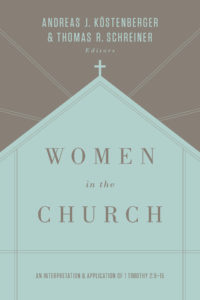
Review: Women in the Church
Women in the Church: An Interpretation and Application of 1 Timothy 2:9-15. Edited by Andreas J. Köstenberger and Thomas R. Schreiner. Wheaton, IL: Crossway, 2016.

Women in the Church has gone through three editions (1995, 2005, 2016), showing that the issue of women in the church still excites intense debate. If anything, the discussion of how women serve in the church has increased in its intensity over the last twenty years. Two sides have emerged, each attempting to articulate how women serve among the congregation. One side affirms that women can function in the church as pastors (egalitarian), while the other side maintains that women cannot serve as pastors (complementarian). 1 Timothy 2:9 -15, the topic of this book, sits in the centre of the debate.
1 Timothy 2:12, for example, reads: "I do not permit a woman to teach or to assume authority over a man; she must be quiet." Situating itself on the side of the complementarian position, the authors of this work undertake a massive effort to understand 1 Timothy 2:9–15 from nearly every angle.
Overview
S. M. Baugh discusses Ephesus in the first century, Al Wolters thoroughly investigates the the controversial term "have authority" (αὐθεντέω), Andreas J. Köstenberger closely analyzes the syntax of 1 Timothy 2:12, Thomas R. Schreiner dialogues with 1 Timothy 2:9–15's scholarship, Robert W. Yarbrough details the hermeneutics of 1 Timothy 2:9–15, Denny Burk overviews translations of "have authority," while the last chapter constitutes a roundtable discussion with various women about the practical application of the passage.
Paul Means What He Says
After unearthing every lexical, syntactical, hermeneutical, and practical detail surrounding 1 Timothy 2:9–15, the authors make the groundbreaking conclusion: "We saw that essentially the passage means what it says" (297). Yes, the scholarly, in-depth research that permeates this multi-author work serves to prove the obvious: the passages means what it says.
Yet Women in the Church is a necessary work because Western churches are, in fact, arguing that 1 Timothy 2:9–15 does not mean what it says.
Some might argue that 1 Timothy 2:9–15 speaks to a specific historical circumstance in Ephesus and is thus not applicable to modern persons. For example, some could argue that women in Ephesus were uneducated and could not be teachers. So Paul's prohibition was meant for that particular audience and does not relate to today's situation. But Baugh's chapter shows that some women did, in fact, enjoy the privilege of education in Ephesus (60).
Others might object that the verb "have authority" means usurp authority or domineer, in which case Paul is arguing that women should not take authority in an improper way. Walters and Köstenberger cogently present arguments to the contrary. Walters' work in particular demonstrates that "have authority" does not communicate a negative ("domineer") nor an ingressive sense ("assume authority"); rather, the verb "is used overwhelmingly in a positive or neutral sense" (113). The effect of this research is that 1 Timothy 2:12 simply means that a women cannot "have authority" over men in ecclesial settings.
Virtues
A number of virtues commend the book. First, Women in the Church is irenic in its tone and fair in its argumentation. This is a book you could give your friends who are either neutral or set against the complementarian position without embarrassment.
Additionally, Women in the Church will help Christians to answer challenges to their complementarian position with scholarly answers. Many professors or Christian leaders propose arguments, explaining that Paul did not prohibit women to have authority as pastors in the church. Women in the Church supplies complementarians with careful, reasoned arguments, demonstrating that Paul did forbid women from preaching in the church.
Third, Women in the Church will also equip pastors and other church leaders to understand what God's word does say about women in the church. If people in your church object to a complementarian position, this book will make you capable to answer almost every question related to the Biblical text of 1 Timothy 2:9–15.
Fourth, Women in the Church integrates each of chapters's smoothly into the whole. While this may not sound amazing, often multi-author books seem jumbled together. This is not the case with Women in the Church.
Vices
Having three editions lends itself to overcoming vices, and Women in the Church does not present any obvious red flags in terms of argument or content.
But at least one warning seems appropriate: Women in the Church is a dense and detail-orientated work. Don't imagine that this book is a weekend read. Yes, it will equip to understand 1 Timothy 2:9–15 in almost every conceivable way. But no, it will not be an easy read.
Conclusion
Pastors, church leaders, and those interested in the topic should read Women in the Church. The authors argue for a complementarian reading of 1 Timothy 2:9–15, which means they interpret Paul as forbidding women to become pastors. While not an easy read, it is a thorough and beneficial read.
Note: Update on April 21, 2017. I received this book for free from Crossway in exchange for a review. But I was nor am under any obligation to provide a positive review.










